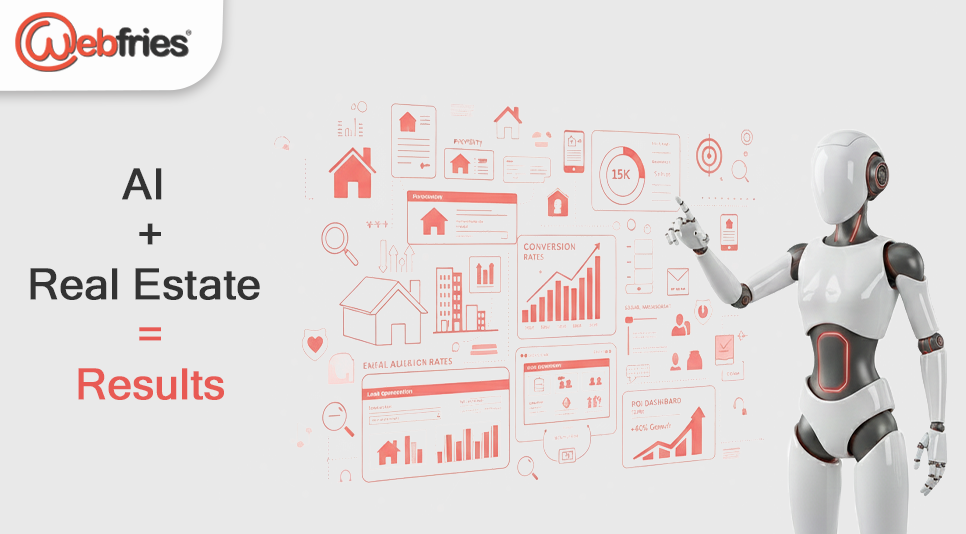Here’s something that might surprise you: PropTech companies using AI in their marketing are leaving traditional real estate firms in the dust. The latest numbers from 2025 show that 43% of home buyers kick off their search online, and get this—every single home buyer ends up using the internet at some point during their journey.
Think about it. The whole game has changed. Buyers aren’t just casually browsing anymore; they’re deep into research mode, expecting websites that seem to read their minds and deliver exactly what they’re looking for before they even know they want it.
Here’s something that might surprise you: PropTech companies using AI in their marketing are leaving traditional real estate firms in the dust. The latest numbers from 2025 show that 43% of home buyers kick off their search online, and get this—every single home buyer ends up using the internet at some point during their journey.
Here’s the real challenge: if you’re a real estate developer, PropTech startup, or property marketer, having gorgeous properties and competitive prices isn’t enough anymore. What matters now is catching potential buyers at that perfect moment with the right message—and you need serious data to pull that off. Just look at the numbers: investors poured $3.2 billion into AI-powered PropTech solutions recently. That’s not pocket change, and it tells you everything about where this industry is headed.
So what are we going to cover here? I’ll walk you through exactly how smart real estate companies are using AI and predictive analytics to completely transform how they sell properties. We’re talking about AI that can spot which leads are actually ready to buy, content that somehow knows what buyers want to see, and marketing systems that work while you sleep.
Whether you’re running a real estate project in Gurgaon, building the next big PropTech platform, or trying to figure out how to actually convert those leads into sales, you’ll find some solid insights here. We’ve helped over 750 businesses get real results with AI-powered marketing, so I know what works and what’s just hype.
Why Traditional Real Estate Marketing Isn’t Cutting It Anymore

Today’s Buyers Are Digital Natives (Whether They Like It or Not)
Let me paint you a picture of what’s really happening in real estate right now. Every home buyer—and I mean 100%—uses the internet during their search process. The National Association of REALTORS® data from 2025 backs this up. But here’s what’s really interesting: buyers typically look at seven properties, and two of those viewings happen entirely online.
Yet somehow, only about 24% of real estate companies have actually updated their marketing to match how people actually shop for homes today. That’s a massive disconnect.
The problem runs deeper than just having a website. Traditional real estate marketing still operates like it’s 1995—broad demographic targeting, generic property descriptions, and salespeople who only respond during business hours. Meanwhile, buyers are out there doing complex research, comparing neighborhoods, crunching investment numbers, and trying to predict what their lives will look like in five years.
The PropTech Advantage And Why It Actually Matters
This is where PropTech companies are eating everyone’s lunch. They get it. They understand that today’s buyers don’t just want information—they want intelligence. They want systems that learn their preferences, anticipate their questions, and provide insights that go way beyond “3 bedrooms, 2 baths, nice kitchen.”
Take what’s happening right here in Gurgaon. The website development in Gurgaon scene has evolved way beyond those basic property listing sites. We’re talking about platforms with AI chatbots that can handle complex questions, virtual tours that make you feel like you’re actually walking through the space, pricing algorithms that predict market movements, and automated systems that nurture leads better than most human salespeople.
The result? These companies respond to inquiries faster and with more relevant information than traditional agents ever could.
The Data Problem Nobody Talks About
But here’s where most companies get stuck: implementing AI-driven marketing isn’t just about buying some fancy software. You need to completely rethink how you collect, organize, and act on customer data.
The companies winning in 2025 are the ones figuring out how to blend human expertise with AI capabilities, creating systems that automate the boring stuff while keeping the personal touch that still matters in real estate.
The AI Marketing Framework That Actually Works
Smart Lead Scoring (Beyond Demographics and Budget)
Forget everything you think you know about lead scoring. AI-powered lead scoring for real estate goes way beyond “35-year-old professional with pre-approval letter.” We’re talking about systems that analyze dozens of behavioral signals to create detailed buyer intent profiles.
Here’s how it actually works: the system watches how prospects behave on your website. Are they viewing property details multiple times? Downloading floor plans? Playing around with mortgage calculators? Researching schools in the area? Each action gets weighted differently, and the AI builds a picture of how serious this person really is.
The game-changer is identifying prospects who are genuinely ready to make decisions versus those who are just browsing. I’ve seen systems correctly identify high-intent buyers who never filled out a contact form but whose behavior screamed “I’m ready to buy.” That’s the kind of insight that separates the winners from the losers.
Content That Reads Minds (Well, Almost)
Once you know what buyers actually want, AI-powered content systems can deliver personalized recommendations that feel almost psychic. This goes way beyond sending different email newsletters to different segments.
We’re talking about dynamic website content that changes based on who’s looking at it, personalized video tours that highlight features most relevant to each visitor, custom investment projections, and social media ads that seem to know exactly what someone’s thinking about.
The most sophisticated systems I’ve seen can predict which property features will appeal to specific buyers based on their behavior, demographics, and stated preferences. A young professional might see content focused on modern amenities, commute times, and investment potential. A family with kids gets information about schools, safety ratings, and community features. Same property, completely different presentation.
Automation That Doesn’t Feel Robotic

The real magic happens with AI-driven nurturing systems that maintain genuine engagement throughout those long real estate sales cycles without burning out your sales team.
Smart automation figures out the best times to reach each prospect, what type of content they prefer, and most importantly, when they’re ready for human contact. I’m talking about chatbots that can answer complex property questions 24/7, follow-up sequences that adapt based on how people respond, and predictive analytics that alert your sales team when someone’s behavior suggests they’re ready to schedule a showing.
The goal isn’t to replace human relationships—it’s to make sure your team spends time on the prospects who are actually ready to move forward.
Making It Work in the Real World
Let’s get practical. You need systems that work together, not a bunch of expensive software that doesn’t talk to each other.
Start with a CRM that actually has AI capabilities. Modern real estate CRMs can automatically score leads, predict conversion probability, and suggest what to do next. Make sure whatever you choose integrates with your website, social media, and marketing automation tools so you get complete prospect profiles.
Getting Your Data House in Order
Here’s the truth: AI is only as good as the data you feed it. You need consistent, comprehensive data from every customer touchpoint—website visits, social media engagement, email responses, phone calls, and face-to-face meetings.
This means setting up standardized procedures for data collection, regular cleaning processes, and integration protocols that make sure information flows smoothly between all your systems. I’ve seen companies that invested in great AI tools but got mediocre results because their data was a mess.
Training Your Team (Because AI Still Needs Humans)
The most critical part that everyone overlooks: making sure your sales and marketing teams actually know how to use these AI insights effectively.
Your people need to understand what the AI-generated insights mean, how to follow up on algorithm-identified leads, and how to maintain the personal relationships that still drive real estate success. The best implementations I’ve seen involve gradual rollouts with extensive training, clear performance metrics, and ongoing optimization based on real results.
Remember: the goal is enhancing human capabilities, not replacing the personal touch that people expect when making one of the biggest purchases of their lives.
Measuring What Actually Matters
You need metrics that show real business impact:
What’s Coming Next (And How to Stay Ahead)

The Technology Evolution That’s Already Happening
Real estate is experiencing a fundamental shift that goes way beyond current AI applications. Companies are already experimenting with AR property tours, blockchain transactions, IoT-enabled smart home demos, and predictive modeling that can forecast neighborhood development impacts years in advance.
Forward-thinking real estate companies in 2025 are testing virtual reality showings that let prospects experience properties from anywhere, AI-powered investment analysis that provides detailed ROI projections for different property types, and predictive market modeling that helps buyers understand future neighborhood changes.
Winning in Saturated Markets
As AI tools become more accessible, competitive advantage shifts to companies that can most effectively combine artificial intelligence with human expertise and local market knowledge. This is especially relevant in markets like Gurgaon, where tons of developers and PropTech companies are competing for the same buyers.
The winners will be organizations that use AI not just for automation, but for generating unique insights that inform better business decisions, create compelling value propositions, and deliver superior customer experiences. Think predictive analytics that spot emerging buyer trends before competitors notice them, or AI-powered market analysis that reveals untapped opportunity segments.
Building Long-Term AI Capabilities
Long-term success means building internal capabilities, not just purchasing AI tools. This means developing data science expertise, establishing continuous learning processes, and creating company cultures that embrace experimentation and iterative improvement.
Companies that invest in comprehensive AI marketing capabilities position themselves to adapt quickly as new technologies emerge, scale successful strategies efficiently, and maintain competitive advantages that are difficult to replicate.
Time to Transform Your Real Estate Marketing Game
Look, the real estate industry is at a turning point. AI and predictive analytics aren’t just nice-to-have features anymore—they’re becoming essential for anyone who wants to stay competitive. PropTech companies using AI-driven marketing strategies aren’t just closing more deals; they’re completely changing how properties get marketed, how buyer relationships develop, and how market opportunities get identified and captured.
Here’s what I’ve learned from working with hundreds of real estate businesses: successful AI implementation isn’t about adopting the latest shiny technology. It’s about creating a comprehensive approach that combines predictive analytics, personalized content, automated nurturing, and data-driven decision making into a marketing ecosystem that enhances human expertise rather than replacing it.
For real estate developers, PropTech companies, and property marketers ready to level up their marketing effectiveness, the path is pretty clear: partner with specialists who understand both the technical complexities of AI and the unique challenges of real estate marketing.
Ready to see what AI-powered marketing can do for your real estate business?
Webfries, and we’ve been helping businesses in Gurgaon achieve real results with our AI-powered marketing approach. Over 750+ companies have used our OmniFries AI ecosystem to get measurable results. Our digital marketing services in Gurugram combine cutting-edge AI with proven real estate marketing strategies, and honestly, our clients typically see 2x ROI within six months.
Whether you need advanced website development in Gurgaon with integrated AI capabilities, predictive analytics implementation, or complete digital transformation of your property marketing processes, our team of AI specialists and digital marketing experts can create customized solutions that actually drive business results.
Want to talk? Email us at sales@webfries.com or call +91-98998 88185 to schedule a consultation. Let’s discuss how AI-driven marketing can accelerate your real estate success and why leading PropTech companies choose webfries as their AI marketing partner.



